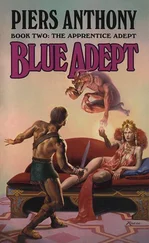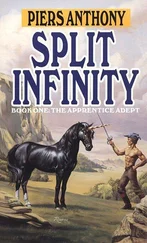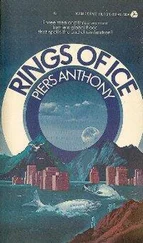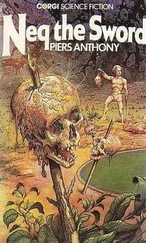I will abolish the group without invoking the mission. The individual members will return to their prior lives.
And if you invoke the mission, and they oppose it?
Then we shall have a problem.
“There it is!” Gaspar cried. “Right on time.”
Don jolted awake. It was night, and the rendezvous was upon them. He had slept when he hadn’t expected to, and it seemed that Melanie had done the same.
They scrambled up and walked their bikes out to catch up with Gaspar, who was standing at the mouth of the cave. Then, together, they advanced on the lone figure beyond.
The third man was Eleph: perhaps fifty, graying hair, forbidding lined face. There was a tic in his right cheek that Don recognized as a stress reaction similar to his own stuttering. Don would have had some sympathy, but for the cold manner of the man.
Gaspar tried to make small talk, but Eleph cut him short. He let it be known that he expected regulations to be scrupulously honored. Obviously he was or had been associated with the military; he would not bend, physically or intellectually. There was an authoritative ring in his voice that made even innocuous comments—of which he made few—seem like commands. Yet he also telegraphed a formidable uncertainty.
Don decided to stay clear of the man as much as possible. Gaspar, undaunted or merely stubborn, used another approach. “Look at that bicycle! How many speeds is that, Eleph?”
Eleph frowned as if resenting the familiarity, though they were on a first name basis by the rules. He must have realized that it was impossible to be completely formal while perched on a bicycle anyway. “Thirty six,” he replied gruffly.
Don thought he had misheard, but a closer look at the machine convinced him otherwise. It had a thick rear axle, a rear sprocket cluster, three chainwheels, and a derailleur at each end of the chain. The triple gearshift levers augmented the suggestion of a complex assortment of ratios. The handlebars were turned down, not up or level, and were set with all the devices Don had, plus a speedometer, horn, and others whose functions Don didn’t recognize. What paraphernalia!
“Don here’s an archaeologist,” Gaspar said. “I’m a geologist. Melanie knows the coordinates for our various encounters. How about you?”
Eleph hesitated, oddly. “Physicist.”
“Oh—to study the effects of this phaseout field under water?”
“Perhaps,” Eleph vouchsafed no more.
It was shaping up to be a long journey, Don realized.
“Melanie, where next?” Gaspar asked.
“Twenty five degrees, forty minutes north latitude,” she said. “Eighty degrees, ten minutes west longitude.”
“Got it. Let’s get deep.”
Gaspar led the way through the shallows, pedaling slowly so that there was no danger of the others losing sight of his lights. Eleph came next, then Melanie, and Don last. That put the least experienced riders in the middle, out of trouble.
All four of them would have to douse their lights and halt in place at any near approach of a boat. So far they were lucky; the surface was undisturbed. Once they reached deeper water there would be no problem unless they encountered a submarine. That was hardly likely.
The barren back reef had come alive. Great numbers of heart-shaped brown sea biscuits had appeared. Delicate, translucent sea anemones flowered prettily. Fish patrolled, searching for food; they shied away from the beams of light, but not before betraying their numbers. Some were large; Don recognized a narrow barracuda, one of the few fish he knew by sight.
The outer coral reef had changed too. The polyps were in bloom, flexing rhythmically, combing the water with their tiny tentacles, just as Gaspar had said they would. In one way they were flowers; in another, tiny volcanoes; in yet another, transparent little octopi. What had seemed by day to be forbidding rock was by night a living carpet.
Now Don observed the different kinds of coral in the reef. Some was convoluted but rounded, like the folds of a—yes, this had to be brain coral. From it rose orange-white spirals of fine sticks: yet another kind of flower that Don was sure was neither flower nor even plant. He swerved toward one, reaching to touch it though he knew he couldn’t. As his hand passed through its faint resistance, the flower closed and disappeared, withdrawing neatly into a narrow tube-stem.
Yet there were dull parts, too. In some regions the coral featured little or no life. It was as if tenement houses had been built, used, and then deserted. But surely the landlords hadn’t raised the rent, here!
“Pollution is killing the reefs,” Gaspar remarked sourly. “Also over-fishing, sponge harvesting, unrestrained memento collecting, the whole bit. The sea life here isn’t nearly as thick as it used to be, and species are dying out. But the average man doesn’t see that, so he figures it’s no concern of his.”
“They are wiping out species on land, too,” Melanie pointed out.
“You think that justifies it?” Gaspar asked sharply.
“No! I think it’s horrible. But I don’t know how to stop it.”
“There are just too many people,” he said. “As long as there keep being more people, there’ll be fewer animals. It’s that simple.”
Don gazed at the barren sections of the reefs. Was it that simple? He distrusted simple answers; the interactions of life tended to be complex, with ramifications never fully understood. Still, it was evident that something was going wrong, here.
The moray eels were out foraging. One spied Don and came at him, jaws open. Don shied away despite his lack of real alarm, and it drifted back. Melanie, just ahead of him, was veering similarly.
Then, remembering his own initial reactions, Don looked ahead to see how Eleph was taking it. This was a wise precaution, for Eleph reacted violently. Two eels were investigating him, as if sniffing out the least secure rider.
Both Eleph’s hands came off the handle bars to fend off the seeming assault. The bicycle veered to the side and crashed into the sand.
Don and Melanie hurried to help the man, but Eleph was already on his feet. “The phase makes the predators harmless,” Don explained reassuringly. “All you can feel is a little interaction in the bones.”
“I am well aware of that!” And Eleph righted his machine and remounted, leaving Don and Melanie to exchange a glance.
Angry at the rebuff, Don let him go. For a physicist specializing in this phase-field, Eleph had bad reflexes.
“And they say that pride goeth before a fall,” Melanie murmured.
Don had to smile. Then he seized the moment. “Melanie, whatever I said before, I’m sorry. I—”
“Another time,” she said. But she smiled back at him.
Then they had to follow, orienting on the lights ahead.
Lobsterlike crustaceans were roving the floor, making free travel difficult. Swimming fish were easy to pass, and living bottom creatures, but inanimate obstructions could be every bit as solid as they looked. When a living creature obscured a rocky projection or hole, and the wheel of the bicycle went through the living thing, it could have trouble with the other. Successful navigation required a kind of doublethink: an object’s position and permanence, not its appearance, determined its effect. More or less.
They coasted bumpily down past the outer reef and into deeper water. But more trouble erupted.
A blue-green blob with darker splotches rose up from the sand in the wake of a scuttling crab. Gaspar’s light speared it—and suddenly the green became brighter as tentacles waved. It was an octopus, a large one.
Gaspar slowed, no doubt from curiosity. Don caught up, while Melanie remained behind. But Eleph, in the middle, didn’t realize what they were doing or what was there. He sped straight on—into the waving nest of mantle and tentacles.
Читать дальше











